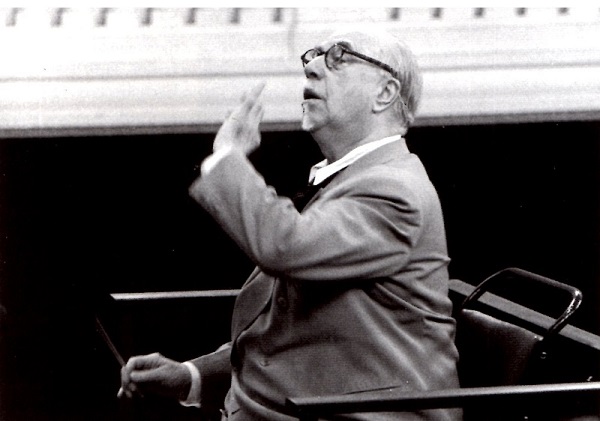
BEECHAM – II – MOZART 1956: Divertimento K131 Symphonies n°29 K201 & n°31 K297
Divertimento n°2 K131 (4 mouvements: I Allegro – II Adagio – III Menuetto II – IV Adagio Allegro molto Allegro assai)
Royal Philharmonic Orchestra (RPO) (Leader Arthur Leavins)
‘Music to Remember 100th’ – BBC Studio Concert – 29 October 1956
______
Symphonie n°29 K201 – BBC Symphony Orchestra (Leader Paul Beard)
Royal Festival Hall (RFH) – 10 October 1956
______
Symphonie n°31 ‘Paris’ K297 – University of Illinois Symphony Orchestra
Mozart Festival University of Illinois – 26 April 1956
Sources: Bandes /Tapes: 19 cm/s /7.5 ips
Trois œuvres de Mozart avec trois orchestres différents, dans trois lieux différents, toutes enregistrées en public au cours de l’année Mozart 1956.
Quelques mois plus tard, fin mars 1957, Beecham a annoncé qu’il s’installait avec son épouse dans le Sud de la France pour des raisons de santé. Il n’allait plus du tout diriger (pour des raisons fiscales) en Angleterre pendant 18 mois, jusqu’à son retour en octobre 1958. Pendant cette période, il a réussi, avec le RPO, à faire des enregistrements à Paris (Salle Wagram) et a monté en octobre 1957 une tournée en Europe. Par la suite, son accord fiscal ne lui permettait pas de rester en Angleterre plus de quatre-vingt-dix jours par an. C’est pourquoi les enregistrements tardifs de Beecham par la BBC sont rares et d’autant plus précieux.
Le Divertimento n°2 K131 (dont il omet les deux mouvements centraux Menuetto I et Allegretto, avec donc le Menuetto II relativement difficile pour le pupitre des cors) débute le programme de la centième édition de ‘Music to Remember‘ avec le RPO, et Beecham ne manque pas de prononcer l’un de ses discours pleins d’esprit. Le programme, qui n’a pas été annoncé à l’avance, est une étrange superposition d’œuvres de six compositeurs différents.
Beecham connaissait Paul Beard depuis 1932 quand il l’avait nommé ‘leader’ (c’est-à-dire ‘Premier Violon’) du London Philharmonic (LPO). Lorsque Beard est devenu en 1936 le ‘leader’ du BBC SO (il le restera jusqu’à sa retraite en 1962), il a rapidement établi une discipline et un contrôle visibles de la section des violons. Lorsque « Tommy » apparut pour la première fois en tant que chef invité du BBC SO, ceci attira son attention et son oreille et, avant la pause de la première répétition, il caressa son menton barbu et, avec un regard narquois et un sourire en direction des cordes, murmura : « Puis-je vous suggérer, messieurs, de prêter un peu plus d’attention à cette barbe (‘beard’) lorsque nous reprendrons ».
L’University of Illinois SO n’était pas un orchestre professionnel, mais l’interprétation donnée lors du Festival Mozart au cours duquel Beecham a dirigé deux programmes ambitieux (24 et 26 avril) est très vivante. Il faut dire que plusieurs semaines de répétitions ont précédé les deux concerts. Le 26 avril, Beecham a également donné une conférence sur Mozart dont le texte a été publié aux pages 174 à 184 du livre de Humphrey Pocter-Gregg ‘Beecham Remembered’ (Duckworth & Co 1976), et dont un extrait concernant la Symphonie ‘Paris’ (n°31 K297) jouée le même jour est donné ci-dessous:
‘La première grande symphonie européenne, complète, d’une maîtrise absolue, d’une structure parfaite, avec le charme de l’invention mélodique, a été écrite par Mozart à Paris. Elle est connue sous le nom de Symphonie de Paris de 1777 – ou de 1778 – j’ai oublié – et je la joue ce soir dans cette institution – la Symphonie de Paris, c’est le premier chef-d’œuvre parmi les symphonies, dont il ne devait pas développer la forme, mais la faire progresser; qu’ Haydn devait accepter et poursuivre, que Beethoven devait accepter et élargir; et que Schubert devait modifier légèrement, mais que tous les compositeurs ultérieurs ont accepté comme base et modèle: tout est contenu dans ceci, le modèle. Comme Tennyson l’a écrit : « Tout le monde peut faire pousser des fleurs maintenant, car tout le monde a la semence ». La graine a été déposée là’.
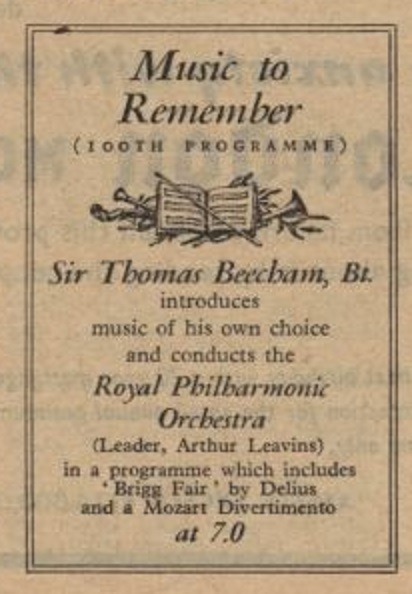

100th ‘Music to Remember’. The Mozart work opens the program
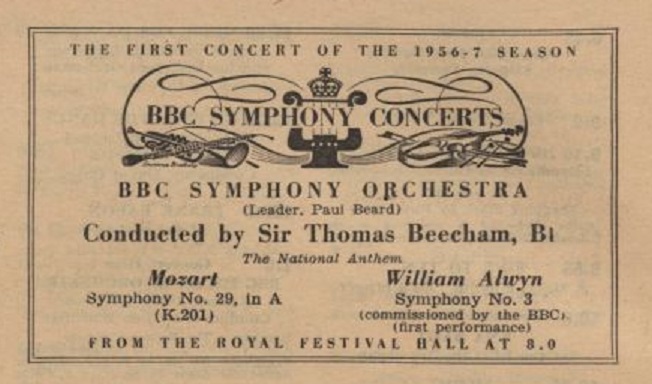
Beecham and the BBC SO at the Royal Festival Hall – October 10, 1956

Beecham – Mozart Festival at the University of Illinois
Three works by Mozart with three different orchestras, in three different venues, all recorded in the Mozart Year 1956.
A few months later, end March 1957, Beecham announced that he and his wife settled in the South of France for health reasons. He was not to conduct at all in England for 18 months (for fiscal reasons) until his return in October 1958. During this period, and with the RPO, he managed to make recordings in Paris (Salle Wagram) and set up in October 1957 a European tour. Thereafter, his tax agreement did not allow him to stay in England for more than ninety days each year. For this reason, late Beecham BBC broadcasts are scarse and all the more treasurable.
The Divertimento n°2 K131 (of which he omits the two middle movements Menuetto I and Allegretto, and thus keeping the Menuetto II with its rather difficult horn parts) begins the 100th programme ‘Music to Remember’ with the RPO, and Beecham does not fail to deliver one of his witty speeches. The programme , not announced in advance, is a strange superimposition of works by six different composers.
Beecham had known Paul Beard since 1932, when he appointed him leader of the London Philharmonic (LPO). When Beard went to lead the BBC SO in 1936 (he retained his post until his retirement in 1962), he soon established a visible discipline and control of the violin section. When ‘Tommy’ first appeared as a guest conductor with the BBC SO, this caught his eye and ear, and before the interval of the first rehearsal, he stroked his barbered chin, and with a sly glance and smile around the strings, murmured: ‘May I suggest to you, gentlemen, that when we reassemble, you pay a little more attention to this beard’.
Although the University of Illinois SO was not a professional orchestra, the performance given at the Mozart Festival during which Beecham conducted two ambitious programs (24 & 26 April) is quite lively. In fact, several weeks of rehearsals preceded the two concerts. On 26 April, Beecham also gave a lecture on Mozart, the text of which was published on pages 174 to 184 of the book by Humphrey Pocter-Gregg ‘Beecham Remembered’ (Duckworth & Co 1976), and of which an excerpt dealing with the ‘Paris’ Symphony (n°31 K297) played the same day is given below:
‘The first great European Symphony, complete, with absolute mastery, with perfection of structure, with charm of melodic invention, was written by Mozart in Paris, known as the Paris Symphony of 1777 – or 1778 – I forget which – and that I am playing tonight in this institution – the Paris Symphony, the first masterpiece among symphonies, the form of which he was not to develop but to carry forward; which Haydn was to accept and carry forward; and which Beethoven was to accept and enlarge; and which Schubert would vary slightly; but which all subsequent composers have accepted as the ground-work and the model: everything is contained in that, the model. As Tennyson wrote: ‘All can raise flowers now, for all have got the seed’. The seed was deposited there.’
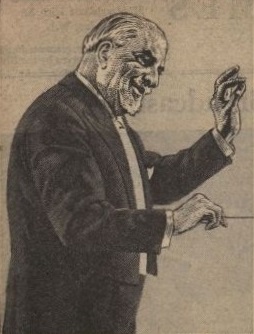
Don’t forget: the name of the programme is ‘Music to Remember‘
Les liens de téléchargement sont dans le premier commentaire. The download links are in the first comment


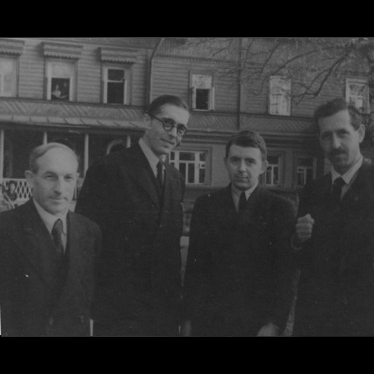
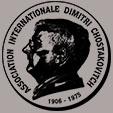
4 réponses sur « BEECHAM – II – MOZART 1956: Divertimento K131 Symphonies n°29 K201 & n°31 K297 »
HD / Hi-Res (24 bits/88 KHz):
https://e.pcloud.link/publink/show?code=kZ2GkDZ8cgr3xzCjyy5p5E6McRBEyvccUs7
Format CD / CD Quality (16 bits/44 KHz):
https://e.pcloud.link/publink/show?code=kZlGkDZn9fhW04n7wVyi6yEgKfaTYSxz77k
Terrific, thank you!
The tax agreement and the impact on Beecham’s conducting caught my interest. I wonder whether there is some other conductor in history to manage taxes in similar way…
In fact, Beecham’s tax agreement was rather a sad story, because its origin was that his wife Betty Humby had a serious health problem, for which the climate of southern France was deemed to be more appropriate, but this was not enough and indeed she died in 1958.
As to other conductors, fiscal optimisation has become rather common practice among companies and artists who have resort to specialized lawyers, but little information surfaces about it.